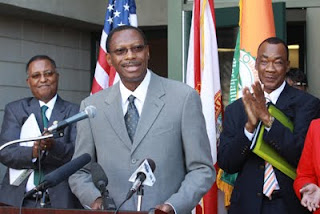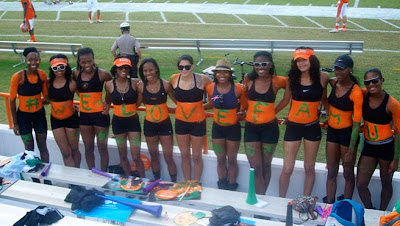 FAMU is set to be rid of Bill Jennings on January 6, 2013. But the university will probably be stuck with at least two trustees who think like him, Richard Dent and Karl E. White (and as many as three if Charles Langston's appointment is renewed in 2013). The amended presidential employment agreement should protect the Board of Trustees from Jennings-style obstructionist tactics in its future contract negotiations with FAMU’s chief executive.
FAMU is set to be rid of Bill Jennings on January 6, 2013. But the university will probably be stuck with at least two trustees who think like him, Richard Dent and Karl E. White (and as many as three if Charles Langston's appointment is renewed in 2013). The amended presidential employment agreement should protect the Board of Trustees from Jennings-style obstructionist tactics in its future contract negotiations with FAMU’s chief executive.
This means there should be a clause that prohibits any individual trustee from using closed-door talks to try and pressure the president into contractual changes that have not been discussed before the entire board at a public meeting. There should also be an evergreen clause that automatically extends the contract by 12 months at the end of each fiscal year unless a 7-6 majority of the board votes to launch a renegotiation process.
No under-the-table dealing
During his final year as chairman, Jennings took it upon himself to turn the process of renegotiating President James H. Ammons’ contract into an ugly power struggle.
Back when Jennings announced his intention to discuss restructuring the bonus clause of Ammons’ employment agreement at the September 23, 2010 board meeting, he never mentioned any plans to try and change the super-majority clause or evergreen status of the contract. Ammons agreed to switch the guaranteed bonus into a performance-based incentive during his talks with Jennings but resisted the former chairman’s efforts to individually strong-arm him into changes that had not been discussed before the entire board at a public meeting.
FAMU’s BOT could have an inked an agreement to restructure the bonus clause months ago had it not been for Jennings’ behind-the-scenes antics. The new contract should prevent this type of situation from ever happening, again. The agenda of the negotiating process should only include items that the full board has voted to discuss with the president.
Clarification of evergreen status
According an article by The Chronicle of Higher Education, a draft of the amended contract for Ammons employs him “through June 30, 2016, with an option for renewal by a supermajority of the board.”
The BOT should remember that Ammons was only hired with a 7-6 vote. Trustees should not give individuals like Langston, Dent, and White the opportunity to build a coalition to block a contractual renewal process with as few as five votes.
The contract’s evergreen status, which has been a source of confusion, should be clarified. The Chronicle’s coverage, for example, has interpreted the clause to mean that “Ammons's three-year employment agreement [is] renewed each day.” The Chronicle also says that “many trustees and outside experts interpreted the evergreen clause to mean that Mr. Ammons, if fired without cause, would continue to receive his $325,000 presidential salary, among other benefits, for three years.”
The August 1, 2006 version of University of Central Florida President John C. Hitt’s employment agreement, as it appears in a signed copy posted on the website of the UCF’s faculty union, could serve as a model for clarifying the evergreen status in Ammons’ contract.
That document says: “The Board shall employ Dr. Hitt as its President for a term of approximately three (3) years, beginning August 1, 2006, and ending on June 30, 2009. Commencing on July 1, 2007, and annually on July 1st thereafter, the term shall automatically be extended by one year unless either party notifies the other in writing, by June 1st of his/its intent not to extend the contract. Dr. Hitt’s employment shall be subject to termination only as provided for in this Agreement.”
No matter which option the FAMU BOT takes, it should only require a simple 7-6 vote for the renewal of the presidential contract. There is no super-majority vote required for the continuation of Mary Jane Saunders' contract at Florida Atlantic University, just like none was required for the continuation of the contract of her predecessor Frank Brogan.
But Saunders' contract, just like Brogan’s former FAU contract, does require a super-majority vote for termination with or without cause.
FAMU has enough pressing challenges to face in the future. It does not need the added headache of Jennings-style obstructionism during its next potential contract negotiation process with Ammons.
 FAMU Professor Andrew Skerritt will host a reception and book signing in the School of Journalism and Graphic Communication (SJGC) Gallery on Tuesday, November 1 at 5:30 p.m. for his book, Ashamed to Die: Silence, Denial, and the AIDS Epidemic in the South.
FAMU Professor Andrew Skerritt will host a reception and book signing in the School of Journalism and Graphic Communication (SJGC) Gallery on Tuesday, November 1 at 5:30 p.m. for his book, Ashamed to Die: Silence, Denial, and the AIDS Epidemic in the South.






























